Donor Spotlights
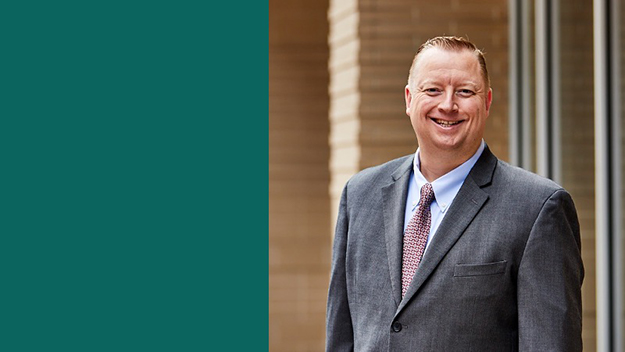
We salute Mr. Steve McKiddy and Mrs. Amy Mckiddy for their active involvement with the medical school. Steve and Amy’s work with the WMed Dean’s Circle Leadership Giving Society has played an
Invaluable role in growing the engagement of Kalamazoo philanthropic leaders in becoming actively involved in the life of WMed. We proudly recognize Steve and Amy McKiddy for their leadership, active involvement, and generous financial support in advancing the mission of the medical school.

We salute Dr. Keith Kenter and Mrs. Patty Kenter for their active involvement with the medical school, our students, and our residents. We are honored by their transformative leadership for both the Department of Orthopaedic Surgery and the WMed Medical Engineering Program and their genuine support to deliver comprehensive and patient-centered care for our patients in the community. Keith and Patty’s tireless advocacy for the mission and programs of WMed, their creative leadership, and their generous financial support continues to play a vital role in advancing the mission of the WMU Homer Stryker M.D. School of Medicine and the medical needs of the community.
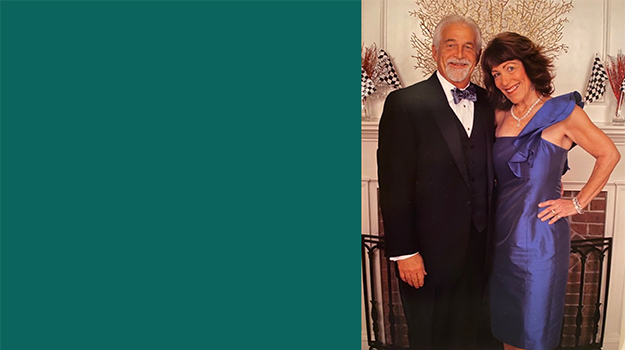
We salute Dr. Thomas G. Ryan And Mrs. Debra K. Ryan and the James R. Ryan Foundation for their leadership in supporting the programs and students of WMed. We are honored by Tom and Deb’s visionary leadership, advocacy, and their generous support for the core mission of the medical school.
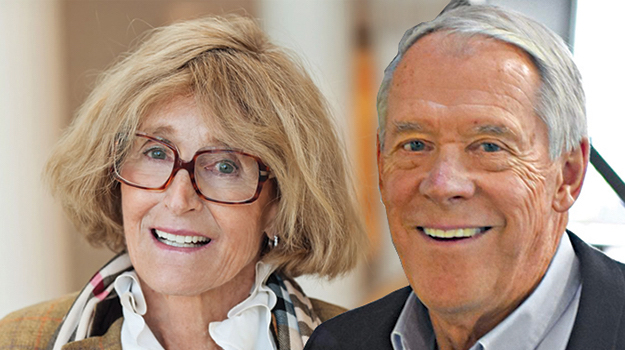
We salute Susan and Bob Brown for their visionary leadership in helping to create vibrant connections between the programs of WMU Homer Stryker M.D. School of Medicine and genuine needs in the Kalamazoo community. Their tireless advocacy for the mission and programs of WMed, particularly focusing on community mental health initiatives for the Kalamazoo Collaborative Care Program, along with their leadership financial support, continue to play a vital role in improving the quality of life in Kalamazoo and in advancing the mission of the medical school.

A generous donation of about $150,000 worth of personal protective equipment from Charles and Lynn Zhang has allowed the medical school to keep its providers safe while they serve the community during the COVID-19 pandemic.

The Zhangs’ philanthropy also included a significant contribution of their time as Lynn Zhang personally spent countless hours sourcing supplies from China amidst worldwide shortages of personal protective equipment.
“All this started when this virus started hitting the community,” Lynn Zhang said. “We really wanted to do something to help. I read the stories about how our frontline doctors and nurses were fighting it and lack of equipment and that broke my heart because they are risking their lives and we don’t have enough protection to give them. I thought, how can we take care of the patients, of the community?”
Zhang said she called WMed leaders and asked what they needed most. She learned the medical school had placed orders for personal protection equipment, but the orders were all backordered as the vendors dealt with limited supplies.
Zhang reached out to a friend in the medical field in China, who said she could help find supplies. Over the last several weeks, Zhang spent numerous hours on the phone – often late at night due to the 12-hour time difference -- sourcing supplies, ordering them and arranging for delivery to the medical school.
“We just want to do whatever we can to help the community,” she said. “It’s such a difficult and challenging time.”
The Zhangs’ donations to the medical school are a small part of what they’ve done in Kalamazoo as the community fights the COVID-19 crisis. They have made donations to the Kalamazoo Community Foundation and donated funds to Bronson Methodist Hospital’s Rapid Response Fund to supply the hospital with more ventilators in the case of a COVID-19 patient surge.
“I believe we’re very blessed to be in the community,” Lynn Zhang said. “Our leadership in the medical school and the hospitals are all working together and focused on one goal to make it happen. That helps. That is so crucial.”
Donations from the Zhangs include surgical masks, gloves, Tyvek suits, booties and goggles – personal protective equipment that is essential to keep providers safe but that has been in short supply everywhere, Robin Scott, the medical school’s Occupational Health Manager, said.
Having an abundance of surgical masks allows WMed Health to provide them to employees and patients. The medical school is requiring all employees and visitors to wear surgical masks while on any WMed campus during the COVID-19 pandemic. The donation allowed WMed Health to share surgical masks with Ascension Borgess Hospital and Bronson Methodist Hospital, along with West Michigan Air Care and Kalamazoo Anesthesiology, Scott said.
Surgical masks protect the air people breathe out, so everyone wearing a mask protects people around them, Scott said.
“If we didn’t have these donations, we couldn’t have everyone wear one,” Scott said.
Each provider has been given a set of the donated personal protective equipment, and WMed Health employees manning the collection site hosted by Kalamazoo County Health and Community Services are using the Tyvek suits to completely cover their clothing as they handle potential COVID-19 positive specimens, Scott said.
Scott said the medical school, like many healthcare facilities around the world, was not able to order the amounts of personal protective equipment needed as the COVID-19 crisis hit because companies were rationing the amounts that could be purchased of everything from cleaning supplies to masks.
“We were having severe limitations, which was frustrating to say the least,” Scott said. “We were handing out more masks and we were starting to use more supplies than normal and we couldn’t order. Those two limitations were huge.”
Scott said the medical school was caught between its limited stock and the amount that was able to be ordered.
“Without this donation I don’t know where we would be,” Scott said. “The time, the money and the effort that she’s put into this is just phenomenal. It truly shows the power of community and I’m hoping that others are seeing that, that we are in this together.”
The donations have had a real impact on WMed Health providers this week, said Debra Taubel MD, chair of the medical school’s Department of Obstetrics and Gynecology. Earlier this week, Dr. Taubel said, a provider used the donated personal protective equipment while performing a cesarean section on a patient with COVID-19 who had been hospitalized in the Intensive Care Unit.
“We were truly fortunate to have our own individual PPE available for a procedure like this,” Dr. Taubel said. “We are extremely appreciative of how quickly we have had protective equipment made available to the WMed family. Through these efforts, we continue to provide necessary care for our patients, keeping everyone safe.”
We can all learn from the Zhangs’ community engagement, commitment, compassion for others’ safety and servant leadership, said Keith Kenter, MD, the medical school’s Associate Dean for Clinical Affairs.
“WMed and WMed Health are proud to accept these gifts and to be associated with our community,” Dr. Kenter said. “It is in times of stress and crisis management that good things like this need to be celebrated. Thank you from the bottom of our hearts.”
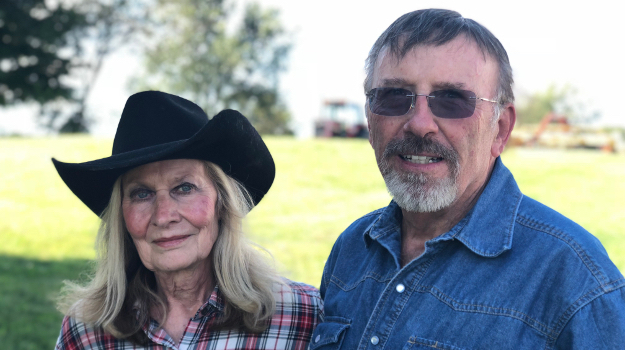
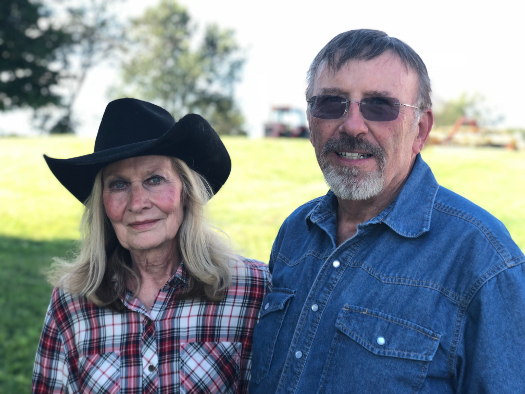
When he retired in 2017 after 20 years of service at Western Michigan University – mainly as Director of Projects and Construction – Conn Macomber had directed a number of pivotal projects for the university, among them the building of the new Sangren Hall, the remaking of East Campus, including Heritage Hall, and, most notably, the renovation of the building in downtown Kalamazoo that became the medical school’s W.E. Upjohn M.D. Campus.
Since closing the book on a very special career at WMU, Conn and his wife, Sheri, have spent their days enjoying their farm and tending to their beloved horses.
And, more than anything, the couple has sought out ways to give back to WMU and the community. Recently, that led the Macombers to make a generous bequest to the medical school that will establish the Macomber Family Endowed Scholarship Fund.
The scholarships, once available, will benefit future WMed students who demonstrate a financial need and recipients will be chosen during any year of their enrollment at the medical school.
“We wanted to do something that was going to benefit everybody,” Conn said. “For us, this is the place. I feel very passionate about the medical school. I love the school, I love the concept and I think Dr. (John M.) Dunn did a fabulous job getting it in place. I think it was his greatest gift to the university as far as I’m concerned.
“It’s the gem,” Conn added. “I think it’s the gem of downtown Kalamazoo too.”
WMU is special to the Macombers and both are alumni of the university. Sheri earned her bachelor’s degree in education from WMU and Conn earned his bachelor’s degree in Physics, Chemistry and Math. Conn also earned his master’s degree in Experimental Psychology from WMU.
Prior to the W.E. Upjohn M.D. Campus opening in 2014, Conn was part of the team that led the $68 million renovation of the building. Today, he recalls the scope of the project fondly and how he worked to have every detail covered right down to the decision to install the building’s terrazzo flooring.
The Macombers said they value the mission of the medical school to train competent and compassionate physicians who will have a positive impact on healthcare in the U.S. The economic impact of the institution also can’t be overstated, Conn said.
“It’s very exciting,” he said. “I think it’s one of the greatest things to ever happen to the city of Kalamazoo. I think two great things really happened recently and one of them was the Kalamazoo Promise and the other was the medical school.
“The economic impact is so great and it’s going to spawn small businesses, research businesses and healthcare, I think, is paramount for our country, as well as training physicians and making services available to everyone,” Conn added. “If you can help that situation out by training more qualified people, the community is going to benefit and the country is going to benefit.”
The Macombers said they are excited about the impact their bequest will have on the medical school and medical education in Kalamazoo. It is a legacy both say they are proud of.
They said they are hopeful that their gift to the medical school will give life to the dreams of aspiring physicians at WMed. They also are hopeful that their generosity will become contagious and prompt alumni and others in the community to give back to the medical school and their alma mater, no matter the size of the gift.
“I know there are people who can’t go to medical school or don’t feel they can because of the money situation even though they are well-qualified,” Conn said. “If we can open that up to them, we’ll have more trained physicians and a better community.”
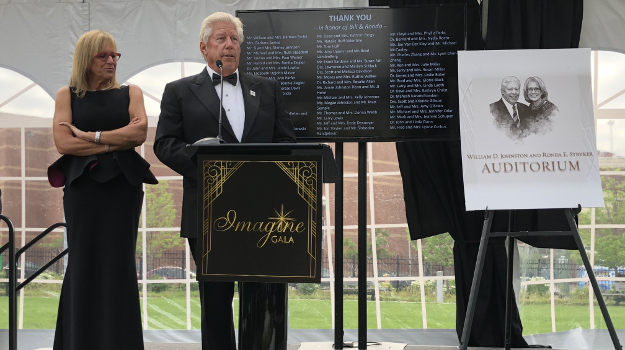
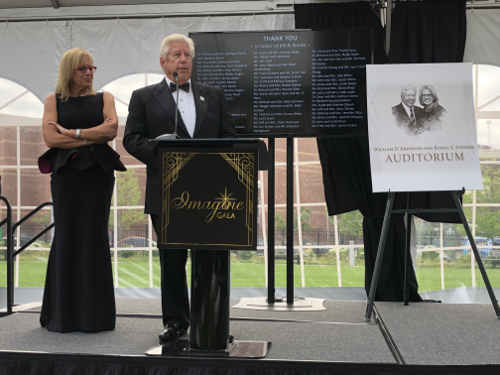
In the effort to birth a new medical school, to mold what would become Western Michigan University Homer Stryker M.D. School of Medicine, William D. Johnston and Ronda Stryker led by example with humility and transformational generosity.
Their $100 million gift in 2011 – the foundational funding for the medical school – has given way to an institution that just last week celebrated the graduation of 48 new doctors from its inaugural MD class.
So, on Saturday, May 19, as the couple served as hosts of the medical school’s 3rd Annual Imagine Gala, WMed leaders, family and friends of Johnston and Stryker, and others from the community gave them a fitting thank you – the naming of the W.E. Upjohn M.D. Campus Auditorium in their honor and $3 million in gifts that will strengthen the medical school’s general endowment and buoy pipeline programs for second graders and high schoolers from Kalamazoo and Battle Creek.
“It’s important to understand that, while the recognition of Bill and Ronda is foremost in our minds, the result of this fundraising – building the endowment – is what will do the most to cement their legacy by creating the financial strength for WMed to continue its trajectory along the path leading to national prominence,” said William U. Parfet who, along with the couple’s daughter, Annie Johnston Henn, was pivotal in the fundraising effort unveiled at Saturday’s gala.
This year’s gala attracted its largest-ever crowd as almost 400 people gathered at the W.E. Upjohn M.D. Campus for the black-tie event. The gala is a fundraiser for Early Introduction to Health Careers I and II, the medical school’s pipeline programs for second- and 10th graders from Kalamazoo Public Schools and Battle Creek Public Schools.
The pipeline programs are designed to champion the biomedical science and healthcare career aspirations of underrepresented and disadvantaged youth in Southwest Michigan. The EIH I and II programs provide a platform for WMed students to design and teach interactive learning experiences to help elementary and high school students develop leadership, team-building and problem-solving skills.
On Saturday, Johnston and Stryker said they were humbled by the fundraising effort that was led by Parfet and their daughter, and honored that the auditorium at the downtown campus will now bear their names.
“I can’t think of a better name for this event,” Johnston said of the Imagine Gala. “Without imagination we can’t get to the doing. We had to have that imagination for the medical school … That’s what we have to do, we have to look at the conditions we’re in in our country, in our state and in our community and imagine the ways we can change those conditions for the better and imagine an opportunity to change students’ lives, to open those vistas to make certain that we are not down the road in a condition where there are underrepresented people in any profession and we have the imagination to do that so then we can get to the serious work of getting it done. I’m just so absolutely proud and thrilled that at this medical school we have had people that have had the audacity to imagine to change the condition that we’re in and have then with those big ideas gathered that circle of philanthropy and made it bigger so that we can get it done.”
The auditorium is the largest and most recognizable space at the W.E. Upjohn M.D. Campus. Since the facility opened in 2014, the auditorium has been the site of numerous events, including the White Coat Ceremony for the inaugural MD Class of 2018, Congressional healthcare roundtable discussions and Stryker Corp. town hall meetings.
“The medical school is a visible reminder of my parents’ desire not only to honor my great-grandfather, Homer Stryker but also to ensure that Kalamazoo sustains its long-held prominence at the forefront of medicine and innovation,” Johnston Henn said. “Their continued commitment to this community is amazing.”
Parfet, the great-grandson of W.E. Upjohn, donated the 350,000 square-foot building that now houses the W.E. Upjohn M.D. Campus. He said Saturday that W.E. Upjohn would be immensely proud of how the generosity of Johnston and Stryker helped reinvigorate a plot of land that was acquired by W.E. Upjohn and served as the growth center for the Upjohn Company.
He said he was proud to work with Johnston Henn to help raise money that will benefit the medical school’s pipeline programs and endowment. He said the medical school has seen significant growth in its research efforts, among other areas, and strengthening the endowment will position WMed for national prominence and build a research engine for biomedical science that will create breakthroughs for understanding and treating disease.
Today, WMed has more than 140 employed faculty, 620 volunteer community faculty and more than 200 resident physicians. Additionally, the medical school now boasts four MD classes and will welcome its newest students – the Class of 2022 – in July. Also notable, every student in the inaugural Class of 2018 matched to a residency program in March during the Match and the students achieved a 98 percent first-time pass rate for the USMLE Step 1 exam, surpassing the national average of 96 percent.
“All of this has been made possible through Bill and Ronda,” Parfet said. “They have assisted at key times to keep the growth and development of this medical school on track and they have done so quietly, remaining in the background. This significant gift is our way of saying thank you and I hope it serves as a reflection of their commitment to the medical school.”
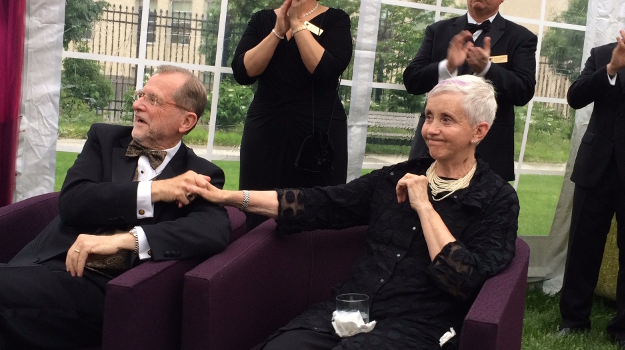
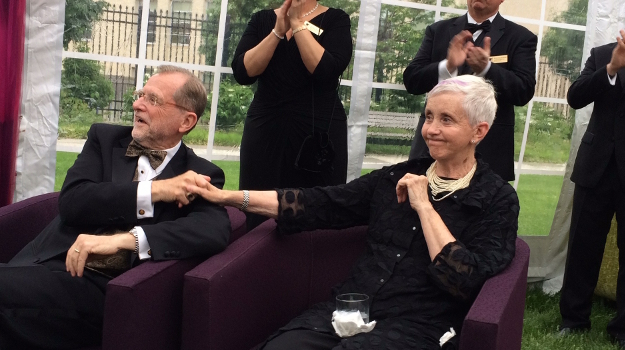
The executive board room at the W.E. Upjohn M.D. Campus will soon be known by a different name – the Dr. John M. and Linda T. Dunn Executive Board Room.
The naming of the third-floor conference room is in recognition of a significant gift to WMed from the Dunns that was officially announced on Wednesday, November 28, 2017, during a special donor reception at the Upjohn Campus.
“We’re really quite proud of the development of the medical school,” Dr. Dunn said. “I met the other day with a major donor who commented that the medical school has exceeded everyone’s expectations. He’s right and Linda and I are proud to be associated with WMed.”
Dr. Dunn, who retired as president of Western Michigan University in August, is a professor emeritus at the medical school and president emeritus of WMU. It was Dr. Dunn, through his visionary leadership and relentless passion, who championed the medical school beginning in 2007 and garnered broad support, enthusiasm, and engagement for the new endeavor from the university, Kalamazoo’s two hospitals – Borgess Health and Bronson Healthcare -- donors, and the community.
In 2011, WMed was formed through a collaboration of WMU, Borgess Health, and Bronson Healthcare. President Dunn served as the founding Chair of the Board for the medical school.
Dr. Dunn said he felt that the executive board room was a fitting location at the medical school to bear his and Linda Dunn’s names given his time as Chair of WMed’s Board of Directors. He also said it was proper given that activities that occur in a board room should represent a team effort much like the team he and Linda have formed throughout their lives as husband and wife.
“Linda has always been very, very supportive and helpful,” he said.
Dr. Hal Jenson, WMed’s founding dean, expressed gratitude for the Dunns and their continued support of the medical school.
“We appreciate President Dunn’s many contributions, which now include this personal gift from he and Linda,” Dr. Jenson said. “This type of philanthropy is transformational for the institution and is the type of leadership gift that we need as we move forward.”
The Dunns will be honored soon at a naming ceremony for the executive board room. A date and time for the event will be forthcoming.
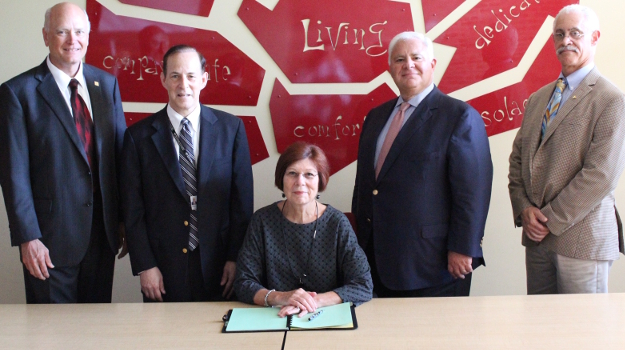

A generous $1 million gift from Hospice Care of Southwest Michigan will fund an endowed palliative care fellowship at the medical school.
The gift, which was approved earlier this year by the Board of Directors at Hospice, is a launching point for the one-year fellowship, which will provide training for up to two physicians seeking certification in geriatric and chronic illness management care after their completion of residency.
“The implementation of palliative care in a community involves high-quality services, education about palliative care for families and providers, and the third sphere is workforce supply,” said Michael Raphelson, MD, medical director of Hospice Care of Southwest Michigan and a clinical assistant professor in the medical school’s Department of Family and Community Medicine. “This fellowship is really the third component of completing palliative care services in the community.”
Doug Czajkowski, the medical school’s Associate Dean for Development, said the $1 million gift is “a great start” towards getting the new fellowship up and running at WMed. The process of gaining approval of the new fellowship by the Accreditation Council for Graduate Medical Education (ACGME) is underway.
He said the medical school will initially bring one fellow to Kalamazoo for the new palliative care program. According to Czajkowski, the medical school hopes to raise $4 million so that the endowment can fund the training of competent and compassionate palliative care physicians for the foreseeable future.
“We can’t thank (Hospice CEO) Jean Maile and the Hospice board enough for providing the resources to make this fellowship a reality,” Czajkowski said.
Dr. Raphelson said the new fellowship and the gift from Hospice could not come at a better – and more critical – time for the field of palliative care.
He said the new fellowship at WMed will help fill what he said is “an extreme shortage” in the number of certified palliative care providers in the U.S. Currently, he said, there are a little more than 5,000 certified providers despite an ever-growing need and a U.S. population that is aging rapidly.
“Never before have our demographics demonstrated the need more,” Dr. Raphelson said. “Ten thousand people turn 65 every day in this country and there are more families in Michigan with a member over the age of 65 than there are with children. There are 5.1 million people in the country with Alzheimer’s and there will be 7 million by 2020, and our elderly population is going to increase to 25 percent of the population by 2030.”
Once the new palliative care fellowship launches at WMed, Dr. Raphelson said fellows will be welcomed into a program that will offer them a wealth of experiences, including rotations at Kalamazoo’s two hospitals, Ascension Borgess and Bronson Methodist Hospital, as well as Bronson Battle Creek, the Battle Creek VA Medical Center, Hospice Care of Southwest Michigan and the West Michigan Cancer Center.
“We’ll train two fellows per year with the goal that if they train here maybe they’ll stay here,” Dr. Raphelson said.
Maile credited Dr. Raphelson for being “the heart and visionary,” and the driving force behind the new fellowship. She said the new program and the decision by the Hospice Board of Directors to give the $1 million gift came after seven years of work by Dr. Raphelson to see a palliative care fellowship become a reality in Kalamazoo.
“This fellowship fulfills our mission of compassionate care at the end of life and will add resources to our community,” said Maile, who has led Hospice as its CEO for the past 25 years. “We thought if we could jumpstart it with a lead gift then that was something we could give back to the community … I think, at some point, you have to create an environment that starts the momentum and that’s what I thought this lead gift might be able to do.”
Dr. Raphelson said that in addition to helping feed the demand for certified palliative care physicians, he believes the new fellowship will also lead to increased awareness about palliative care among medical students and residents in Kalamazoo and spark interest among them and physicians in the community about broadening their skill set.
“I feel this community has everything it needs to provide high-quality palliative care training,” Dr. Raphelson said.
Czajkowski said the new fellowship is a clear example of the spirit of community collaboration that is needed for the fellowship – and the medical school – to be successful. To help get the new fellowship off the ground, he said, Bronson has agreed to fund the salary portion of the first year for the program’s first fellow.
“This fellowship shows how the community and our hospital partners are working with us to create programming that will benefit patients and the community at large,” Czajkowski said.
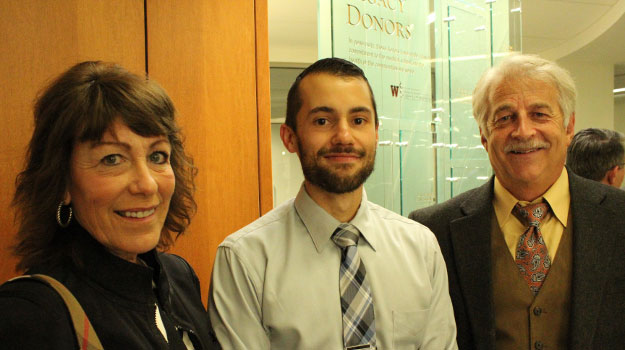
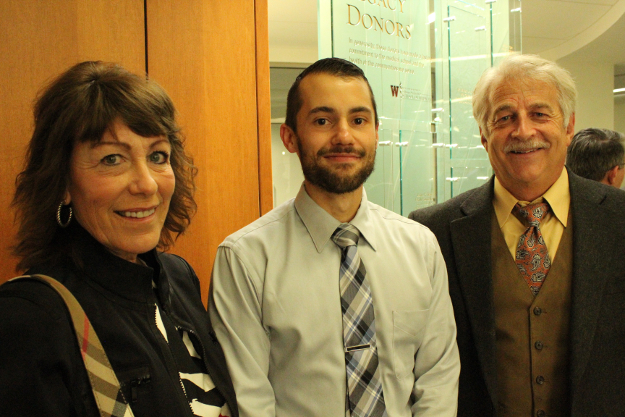
From the time he began medical school two years ago as a member of the inaugural class at Western Michigan University Homer Stryker M.D. School of Medicine, Sam Yost says the support of the Kalamazoo community – and its investment in the success of WMed -- has always been very apparent.
Yost, 33, a third-year MD student, got a very tangible reminder of that this fall when he was named the first-ever recipient of the James R. Ryan Family Foundation Scholarship, a $2,000 award that will go toward Yost’s tuition and recognizes him as the top student in the Class of 2018.
“I’m pretty internally motivated but, at the same time, it’s nice when someone else notices and says, ‘Hey, good job,’” Yost said recently.
The James R. Ryan Family Foundation Scholarship will be given annually at WMed to the top-ranked rising third-year student at the conclusion of their second year, as well as the top-ranked rising fourth-year student at the conclusion of third-year clerkships.
WMed students do not apply for the merit-based scholarship, so Yost said it was a welcomed surprise when he received an e-mail from Dr. Pete Ziemkowski, associate dean for Student Affairs, and Financial Aid Director Deirdre Moore informing him that he was named a recipient.
“That was the first time I had heard of the scholarship,” Yost said. “It was a happy discovery.”
The scholarship is the result of the generosity of Dr. Thomas and Mrs. Debra Ryan who, since 2012, have given almost $400,000 to the medical school through the James R. Ryan Family Foundation. Their donations have led to endowments for the annual scholarship, as well as for the Curtis M. Hanson M.D. and E. Dennis Lyne M.D. visiting professorships.
“Their true impact here through philanthropy, it’s getting pretty big,” said Al Shifflett III, engagement manager for the medical school’s Office of Development.
WMed will honor and thank the Ryans and other donors Thursday, Nov. 17, during a special reception at the W.E. Upjohn M.D. Campus.
Yost said he was inspired by the scholarship and hopes to be just as generous as the Ryans once he graduates medical school and begins his work in the medical field.
“This kind of thing coming from someone in the community is a nice sign of the community’s investment in the medical school and what we’re doing here,” Yost said.
Yost, who is the oldest student in the Class of 2018, was born in Saginaw and grew up between there and Midland. He earned a degree from Saginaw Valley State University where he dual-majored in Psychology and Public Administration, and later earned a master’s degree in Public Health at the University of Michigan.
Yost came to WMed after stints as a hospital administrator and project manager at Detroit Receiving Hospital, as well as working as a research assistant at the Pacific Neuroscience Institute in Santa Monica, California.
After graduation, Yost said he wants to work in the field of gynecologic oncology and, as of right now, has his eyes set on completing a four-year residency in obstetrics and gynecology and then pursuing a three-year fellowship for gynecologic oncology. Yost said part of the reason for his interest in the specialty stems from his mother dying of cancer.
“(Gynecologic oncology) has a lot of different aspects to it that I really like,” Yost said. “You get the medical side of things, you care for patients … and take care of them long-term. You get to do surgery, as well … and you get long-term relationships.”
With the scholarship at WMed, Dr. Thomas Ryan said he and his wife wanted to set up an award that was “based on merit and achievement” that will, hopefully, help a student like Yost stand out for competitive residency programs and fellowships.
Shifflett said the James R. Ryan Family Foundation Scholarship is the first endowed scholarship at WMed. Other endowed scholarships will be offered in the near future, he said.
The James R. Ryan Family Foundation draws its name from Dr. James R. Ryan, Dr. Thomas Ryan’s uncle and an alumnus of Western Michigan University who was an accomplished orthopaedic surgeon. Dr. Ryan said his uncle, who lived and practiced for a time in Kalamazoo prior to his death, taught at the Kalamazoo Center for Medical Studies, a predecessor to WMed, and dedicated his entire life to teaching and helping orthopaedic surgery residents.
Had he been when the medical school opened its doors in 2014, Dr. Ryan said he has no doubt that his uncle would have been extremely supportive of the institution.
“It meant a lot,” Dr. James Ryan said. “We were very happy to set up the scholarship … It certainly accomplished what we wanted to -- and had set out to -- accomplish.”
Dr. Thomas Ryan and Debra Ryan are both Kalamazoo natives who attended Comstock High School and are proud WMU alumni. Like his uncle, Dr. Ryan is an orthopaedic surgeon and works in Kalamazoo. He completed his residency in orthopaedic surgery at the Southwest Michigan Area Health Education Center, a predecessor of WMed.
Dr. Ryan and his uncle worked together in private practice in Kalamazoo after Dr. James Ryan retired and moved to Southwest Michigan. In addition to the scholarship at WMed, the Ryan Family Foundation has other ongoing philanthropic efforts, including an annual college scholarship program that benefits an eighth-grade student at Gull Lake Community Schools.
In addition to his work as an orthopaedic surgeon, Dr. Thomas Ryan serves on the WMU Alumni Association Board of Directors and is a clinical assistant professor for Orthopaedic Surgery at the medical school.
Jean Shelton, WMed’s director of Admissions and Student Life, said Yost’s scholarship and the Ryans’ generosity are a reminder of how the Kalamazoo community truly is a partner in the medical school’s success and the success of its students.
“We’ve said from the very beginning that Kalamazoo is our partner in this medical school and they’ve taken an active role … in welcoming our students,” Shelton said. “Scholarships like this really embody that commitment from this community. We’re not just teaching our students about what it means to be a member of the Kalamazoo community, we’re teaching them how to be a good community member where they end up and wherever they end up calling home.”
